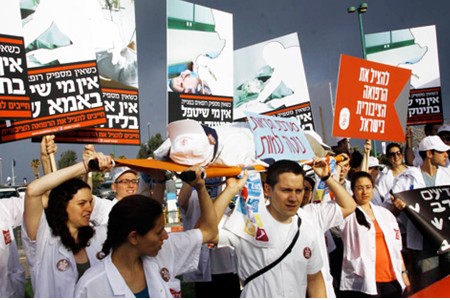
Doctors’ union, the Israel Medical Association (IMA), charged on Thursday evening that the Treasury backtracked on agreements it reached on the number of night and weekend shifts that would be required of doctors. “We returned to square one,” it said.
On Sunday, doctors’ sanctions will shut down all elective surgery except emergency and oncological surgery. On Monday, all hospitals and community health fund clinics owned by Clalit Health Services will strike, except for urgent cases. On Tuesday, the Sunday schedule of sanctions except for urgent and oncological surgery will be held. On Wednesday, only urgent and oncological operations will be held in hospitals. In addition, hospital outpatient clinics, diagnostic clinics, psychiatric and geriatric hospitals and day hospitals in general will shut down. On Thursday, the same schedule of sanctions as on Wednesday will be held.

Doctors’ demonstration (photo: Doctorsonly)
The doctors have been applying sanctions intermittently for two-and-a-half months, demanding a new contract and reforms involving doctors in the periphery, residents, interns and pensioners.
The Nurses’ Association, a part of the Histadrut (Federation of Labour in Israel), says its members will cut by two the number of beds in each hospital’s internal medicine department where seriously ill patients are attached to ventilators and thus require much more supervision and treatment. The association charges that the Finance and Health Ministries have reneged on its agreement in January – at the height of the flu season – to add 190 nursing slots in hospital intensive care units. Nurses union chief Ilana Cohen has charged that only a handful of nurses have been added since then to the wards. The action will be taken to protect lives, said the association, as too few nurses on duty mean too little treatment for patients.
In the agreement last winter, the two ministries agreed that maximum capacity in internal medicine departments would be 120 percent by the end of this year, with a further reduction to 115% at the end of 2012 and to 110% a year thereafter. “As agreed, we will not admit patients to internal medicine departments beyond these capacity rates,” Cohen added. The IMA has voiced its support for the nurses struggle.


